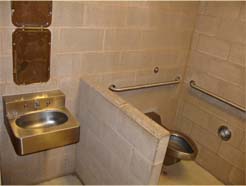Located in Central Akron is a seemingly quiet and peaceful street, Dan Street, which is the home of the Summit County Juvenile Detention Center. Here you can find the most serious youth offenders as they await their final disposition and fate.
As of this year, crime rates in Akron have increased by 4.7% (Akron Beacon Journal, September 27, 2007), and “Ohio has been labeled as the third worst state for youth,” said Becky Retzer, the Director of True North Ministries, an outreach to teens in prison.
 According to the Summit County Juvenile Court, 3,273 youths were charged with delinquent or unruly acts in 2002, and 1,788 youths fill the eight state juvenile facilities (The Columbus Dispatch, January 1, 2008). “There are some serious drug, mental health and gang issues in this county,” Don Ursetti, the Summit County Juvenile Court’s Outreach and Education Director acknowledged.
According to the Summit County Juvenile Court, 3,273 youths were charged with delinquent or unruly acts in 2002, and 1,788 youths fill the eight state juvenile facilities (The Columbus Dispatch, January 1, 2008). “There are some serious drug, mental health and gang issues in this county,” Don Ursetti, the Summit County Juvenile Court’s Outreach and Education Director acknowledged.
Part of the Problem
What is causing so many young people to end up on Dan Street? Why are so many guilty of drug abuse, theft and other harmful behaviors at such a high rate? And is there a solution to this growing problem?
Judge Linda Tucci Teodosio, Summit County’s Juvenile Court Judge said on a recent visit, “So many of the kids that we see here have no hope, no goals, no vision.”
Family is also an issue. Teodosio explained, “So many come from families that are struggling. They’re juggling jobs.” Many come from homes being run by mom or grandma who are trying to hold up two or more jobs just to make ends meet. The instability at home and lack of support of a father figure combined seems to create much of the instability in the attitudes and behaviors of the youth.
Some Solutions
“I like to look at each child as a puzzle,” Teodosio smiled, with a glimmer of hope in her eyes. “We try to find something positive that they’re interested in, find what they’re having problems with and find a solution.”
 Many of the young men have shown an interest in landscaping which moved the facility to put in a garden and greenhouse. They grow vegetables and share the extras with the needy at a food bank. “This gives them a feeling of fulfillment and achievement while they’re here,” Teodosio said. The facility also put in a library, with the hope that by providing these outlets the teens will find more positive ways to spend their time.
Many of the young men have shown an interest in landscaping which moved the facility to put in a garden and greenhouse. They grow vegetables and share the extras with the needy at a food bank. “This gives them a feeling of fulfillment and achievement while they’re here,” Teodosio said. The facility also put in a library, with the hope that by providing these outlets the teens will find more positive ways to spend their time.
The center offers several programs including Crossroads for children ages 12-17 with substance abuse/dependence problems and mental health illness, the Child Responsibility Project which provides work experience for the youth offenders so that they can pay back their victims, the Firearm Safety Program which informs students on gun safety, and CASA (Court Approved Special Advocates) which provides the children with a volunteer who helps them make decisions based on their best interests. (More information on programs below)
There is also a great need for mentors. “We could really use mentors. It’s always an issue,” Teodosio stressed. The guidance of a mentor could be the one thing a child needs to turn his or her life around.
The Family Resource Center is also available for anyone to visit. It offers case management and referral services to those facing teen pregnancy, school-to-work, transition into the community following a term in a detention center, and domestic violence issues. It is a collaborative effort with the Court and the Summit County Department of Job and Family Services.
How the System Works
As for the Court process, any child under the age of 18 who violates a law that is considered a crime if committed by an adult is considered by definition to be a delinquent. Either the police escort the delinquent child to the Court, or they come as a result of being summoned from the Court. A Court Intake Officer reviews the Complaint against the child and decides what to do, based upon available alternatives. The child may be referred back to a local police department for a “diversion program” or go through the official court process. This decision is based on a number of factors, including the severity of the offense and the child’s past involvement with the Juvenile Court. Once determined delinquent, the child may be placed on probation, referred to one of many rehabilitative programs or sent to youth prison. The Judge or Magistrate makes this decision based on a variety of factors.
While in detention each child receives a complete medical screening, as well as drug, alcohol and psychological assessments; they attend school taught by instructors provided by the Akron Board of Education; they are allowed a 45 minute visitation once a week; they participate in numerous activities such as physical recreation, education and tutoring, drug/alcohol awareness, Planned Parenthood education, anger management and other community outreach programs. Religious programming is provided, but is not mandatory.
“We try very hard to keep kids out of detention,” Teodosio explains, “if kids that are of low risk are exposed to a high risk environment their behavior will change and escalate as opposed to them having a positive affect on the other kids that are in the high risk environment. So if you put a kid in detention he’s going to rise to the level of the kids that are there with him as opposed to being a stabilizing affect on the other kids. If you can safely keep a child in their home or environment that is always a better option because you will avoid the risk.”
Every child that is brought into the detention center is given a chance to change. No child is seen as a helpless case. Don explained, “Judge Teodosio thinks that everyone is salvageable. No one is disposable.”
Programs Available
- Crossroads accepts children between the ages of 12 and 17 with substance abuse/dependence problems and mental illness. The youth meet with their assigned probation officer 2-3 times per week, attend court hearings, submit frequent urine drug screens and attend counseling to improve the family unit. The program lasts for a minimum of one year. Children outside of the juvenile court system are not eligible for the program.
- The Child Responsibility Project provides a meaningful work experience for youth offenders so they can earn money to pay restitution to victims of their offences and to teach them accountability for their actions, as well as the consequences of their delinquent act.
- The Firearm Safety Program informs students throughout Summit County of the dangers of firearms, how to react if confronted with a situation involving a firearm, and how to inform the proper authorities if they suspect that a person has a firearm. The Courts Gun Safety Info Line: (330) 643-8811. Firearm Education Officer - Steve Stahl: (330) 643-7625
- CASA (Court Appointed Special Advocates)/Guardian ad Litem provides children who are under court supervision as a result of allegations of abuse, neglect or dependency with a trained community volunteer who assists the court to make decisions that are in the child’s best interests.
If you have any story ideas, questions, or comments you can contact me at Katie@akroneur.com.